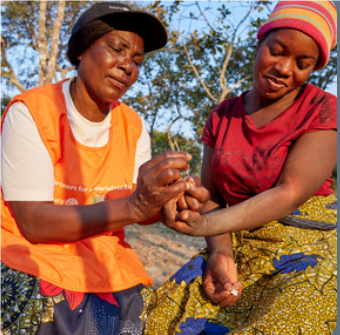Editor's note: December is Disease Prevention and Treatment Month. This article taken from Rotary International's website showcases how Rotary took on Malaria in Zambia.
Backed by Rotary’s Programs of Scale award, Partners for a Malaria-Free Zambia confronts a worldwide malady at the local level.
By Diana Schoberg
Photography by Esther Ruth Mbabazi
Photography by Esther Ruth Mbabazi

Latham Chisanga had been in a car accident a few years back, and he’d dealt with the physical repercussions ever since. So, in February 2020, when a backache and fever came on, Chisanga skipped another visit to the clinic, swallowed a couple of painkillers, and got on with his life. Days later, he collapsed outside a neighbor’s house and fell into a coma. At the hospital, his malaria test came back positive. He died a few days later.
His mother, Martha Lungu, wondered how this could have happened to a member of her family. After all, she was the executive administrator of Malaria Partners Zambia, the local branch of an international campaign led by Rotary members to end malaria. Lungu, a member of the Rotary Club of Ndola, didn’t see how she could continue her work. “How did I fail?” she lamented. “How come I didn’t do this right? And how am I going to talk to people about the prevention of malaria?”
A few months later, two people intervened. "You need to use your son's death to educate others, so we don't lose another life," insisted a minister who had attended her son's funeral. And a friend convinced Lungu that her son's death gave her more credibility, not less. "If it happened to me, it could happen to anyone," Lungu says, conveying her friend's message. "I know what I'm talking about. I know malaria kills. And I know malaria can be cured."
It's late May 2022 in Zambia's Central Province, and six people meander along a dirt path past garden beds, a church, and brick houses with corrugated roofs until they reach a home where chickens peck in the yard and freshly washed laundry hangs on a line, flapping in the morning breeze.
There they are greeted by Agnes Mukonde. A week earlier, Mukonde had experienced aching joints, headaches, and chills. She'd had malaria before and recognized the symptoms. She got tested: positive. Fortunately, a nearby health center — the place from which the group of six had departed earlier that morning — provided Mukonde medication, and she felt better within days. Now her visitors are here to test her children and neighbors to find out if any of them have been infected.
Mukonde's six visitors are students training under an ambitious new plan by the Zambian government to make malaria testing and treatment more accessible by saturating the country with 36,000 community health workers — that's about one worker per 500 people. The national strategy is getting a boost from Partners for a Malaria-Free Zambia, an initiative founded and led by Rotary members and the recipient of Rotary's first $2 million Programs of Scale grant. Partners for a Malaria-Free Zambia will train and equip 2,500 community health workers in 10 districts in Zambia's Central and Muchinga provinces. By partnering with World Vision U.S. and the Bill & Melinda Gates Foundation, which will each contribute another $2 million to the endeavor, it's anticipated that the program will reduce malaria infections and significantly diminish the number of severe and potentially fatal cases.
"Members of Rotary should be proud of themselves for coming on board to fight malaria," says Lungu, who chairs the program's implementing committee. (She also moved into the role of executive director for Malaria Partners Zambia several months after her son's death.) "Imagine how many lives they will save because of the community health workers that they have helped train and deploy."